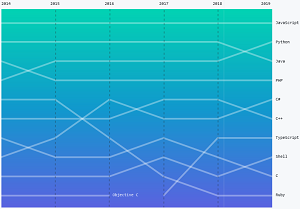News
2019 GitHub Octoverse Report: VS Code Again No. 1, C# Climbs in Popularity
The sprawling State of the Octoverse 2019 report on all things GitHub shows Visual Studio Code is once again the No. 1 project on the open source development platform, and C# has risen in the ranks of programming language popularity.
The report crunches metrics on hosted open source development projects from more than 40 million developers and nearly 3 million organization accounts for one of the most comprehensive development reports in the industry, comparing and contrasting results from previous years.
Just like last year, Microsoft -- which of course now owns GitHub -- has fared well.
"This year, popular open source projects are topping 10K contributors," said GitHub. "Two have been on this list since 2016: microsoft/vscode and ansible/ansible. New in 2019 are flutter/flutter, firstcontributions/first-contributions, and home-assistant/home-assistant."
While VS Code repeated as the No. 1 project by contributors, MicrosoftDocs/azure-docs clocked in at No. 2.
Not only that, but aspnet/AspNetCore is the No. 1 fastest-growing open source project by contributors, with MicrosoftDocs/vsts-docs coming in at No. 3 behind Flutter.
On the programming language popularity front (ranked by repository contributors), C# climbed a spot to No. 5, overtaking C++.
 [Click on image for larger view.] Number of Contributors to Open Source Projects (source: GitHub).
[Click on image for larger view.] Number of Contributors to Open Source Projects (source: GitHub).
"This year, C# and Shell climbed the list," the report said. "And for the first time, Python outranked Java as the second most popular language on GitHub by repository contributors.""
Dart was by far the fastest-growing language, followed by Rust and HCL. Microsoft's own TypeScript was No. 5 on that list.
Other highlights of the report as highlighted in a Nov. 6 post and in the report, include:
- Dart and Rust topped our list of fastest growing languages by repository contributors.
- The use of Jupyter Notebooks (by number of repositories with Jupyter as their primary language) has seen more than 100% growth year-over-year for the last three years.
- When counting contributors to its dependencies, TensorFlow's contributors grow from 2,238 to a global community of 25,166 people.
- 44 million-plus repositories were created in the last year—and 44% more developers created their first repository in 2019 than in 2018.
- Most GitHub users (nearly 80%) come from outside of the United States.
- 35 of Global Fortune 50 companies have made contributions to open source in the last year, and 29 are building the software behind their businesses on GitHub Enterprise.
- 7.6 million-plus security alerts were remediated this year by developers, maintainers, and security researchers across the community.
-
"Star worthy" projects included:
"It's that time of year again, when we ask ourselves, 'What can 40 million developers do in 365 days? GitHub'"" said in its post. "Today we published our annual Octoverse report, showing that the world's software is built by a global community, one that's growing, evolving, and increasingly interconnected. This year, we've seen that the way developers work together can change fast. We've also seen that software development is, increasingly, a community endeavor as it becomes easier to find and build on work from others around the world. And some of the top open source projects not only have thousands of contributors—they're dependencies for millions of repositories."
About the Author
David Ramel is an editor and writer at Converge 360.